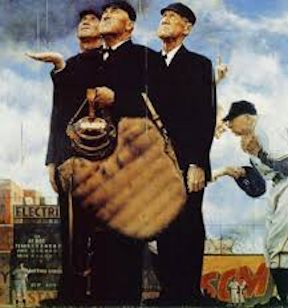 Balks
Balks
There are a large number of rules that apply only to the pitcher, and nearly all of them apply only when the pitcher is in contact with or astride the pitching plate (the "rubber"). When there are runners on base, these actions result in a balk. When there are no runners on base, most (but not all) of these actions result instead in an illegal pitch.
The penalty for a balk is that all base runners are awarded one base. The penalty for an illegal pitch is awarding one ball to the batter (unless the batter reaches first base safely on the pitch).
A balk is a delayed dead ball. When you call a balk, verbalize it loudly. If the pitch is delivered, wait until the catcher receives the ball and then call time, announce the balk, and award bases. If on the pitch the ball is put in play, allow play to conclude.
Important: If the ball is put in play on a balk and all runners, including the batter-runner, advance at least one base, then wave off the balk and play on. If all runners do not advance one base safely, wait for action to conclude and then enforce the balk.
Note: High school (NFHS) rules differ in that balks are an immediate dead ball, regardless of the outcome of the pitch. For reference, see FED Rules 6-2-4 and 6-2-1.
The rules covering balks, 6.02(a)(1-13), lists thirteen infractions that result in a balk if runners are on base. Rules 6.02(b) and (c) deal with illegal pitches (infractions with the bases unoccupied) and with "pitching prohibitions." Rule 6.02(d) outlines penalties and remedies.
Following are summaries of the thirteen sections of 6.02(a), along with brief commentaries.
The "catcher's balk"
In addition to the thirteen sections of Rule 6.02(a), you should also pay attention to the related issue of the "catcher's balk":
Rule 5.02(a). If a catcher leaves the catcher's box before the pitcher delivers the pitch (as when giving an intentional walk), the pitcher shall be charged with a balk (with runners on base), or with no runners on, an illegal pitch (ball to the batter).
Rule 6.01(g). If, with a runner on third base and trying to score by means of a squeeze play or steal, the catcher or any other fielder steps in front of home base without possession of the ball, or touches the batter or the bat, the pitcher shall be charged with a balk ("catcher's balk"), the batter shall be awarded first base on the interference ("catcher's interference") and the ball is dead.

